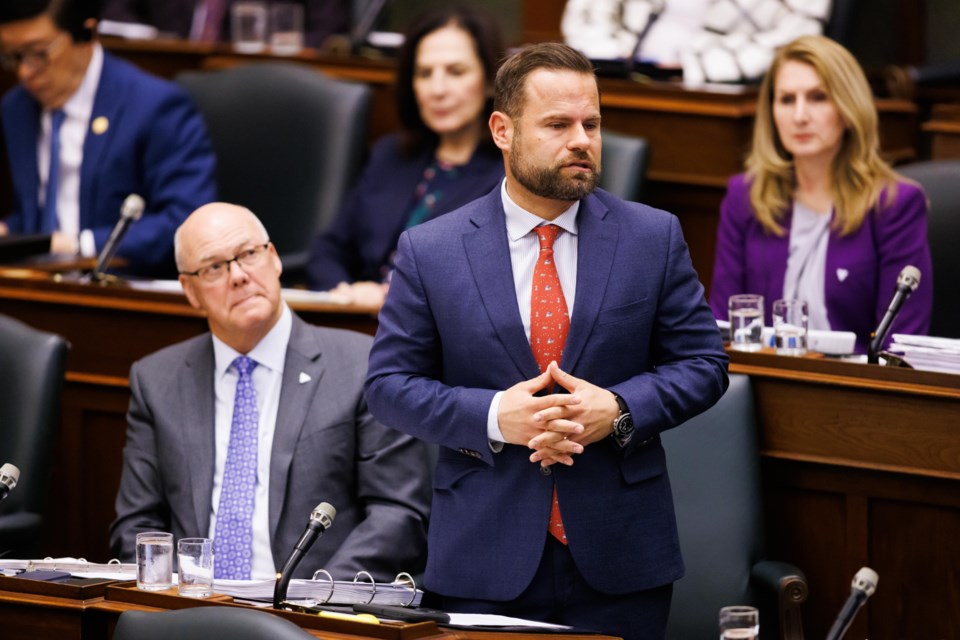The Ford government is looking to bypass municipalities to get select training centres built, to the delight of several construction industry leaders.
Under the Working for Workers Seven Act, introduced on Wednesday, the government would be able to impose non-specific “limits and conditions on the power of a municipality” regarding the use, development or redevelopment of training or skills development centres, including the grounds those buildings sit on — as long as the centres are at least partially funded by the provincial government.
Such buildings could also be exempted from Ontario’s Planning Act and parts of the City of Toronto Act that relate to zoning and development, though these exemptions would not apply in the Greenbelt.
Projects would still have to obtain “health and safety focused permits and approvals,” the government said, including those under the Ontario Building Code and the Fire Protection and Prevention Act.
The law would be a boon for construction industry unions, which have been largely supportive of the Ford government, and which the government has, in turn, given tens of millions of dollars in grants to build training facilities.
The Laborers' International Union of North America (LiUNA), in particular, has been a close political ally of Premier Doug Ford’s Progressive Conservatives during their time in power, which has included being regular collaborators with the government.
Ford and his cabinet appointed LiUNA’s international vice president and central and eastern Canada regional manager Joseph Mancinelli to McMaster University’s board of governors and the board of Invest Ontario. He’s served for over three years in each position.
LiUNA also backed the PCs in the 2022 and 2025 election campaigns, with Mancinelli saying the party “completely aligned” with the union.
Labour Minister David Piccini first announced the proposed changes on Monday at a LiUNA facility in Richmond Hill, where he said the process to construct, renovate and expand training centres is “defined by paralysis by analysis or the endless carousels of ‘no.’”
“Those 'noes' that we often see at the municipal level keep these men and women from working,” he said. “These are expansions that are going to train a next generation of young men and women, and we can't wait.”
Several business groups in the construction and trades industries talked up the new law in the government’s news release.
Nadia Todorova, the executive director of the Residential and Civil Construction of Ontario, praised the bill for “cutting red tape to accelerate the construction of training centres.”
Sandy MacLeod, the CEO of HRAI, a trade association representing companies in the HVAC and refrigeration industry, said her organization “applauds the government’s commitment to streamlining training centre development,” among other changes.
Organizations representing companies and workers in road building, carpentry, construction, trucking and sewer building were also quoted in the release.
Eligible projects are those receiving funding through the government’s Skills Development Fund Capital Stream. According to the province’s 2025 budget, there are 41 projects that have received funding through this stream so far. The program also received a $150-million top-up in the latest budget, to be distributed over three years.
The new bill tabled Wednesday also makes changes to the Employment Standards Act, which the government says is meant to protect workers “when they need it the most.”
Among the changes are requirements for job posting platforms to have a mechanism to report fraudulent job postings, permit job-seeking leave for certain employees impacted by mass layoffs, and permit extended lay-offs in certain circumstances.
It also requires automated external defibrillators on construction projects with 20 or more workers, cracks down on employers who give false information or hide payroll records, grants inspectors authority to require in-person interviews with applicants through the Ontario Immigration Nominee Program, and gives the minister of labour the ability to establish or remove immigrant nomination streams.
—With files from Charlie Pinkerton



